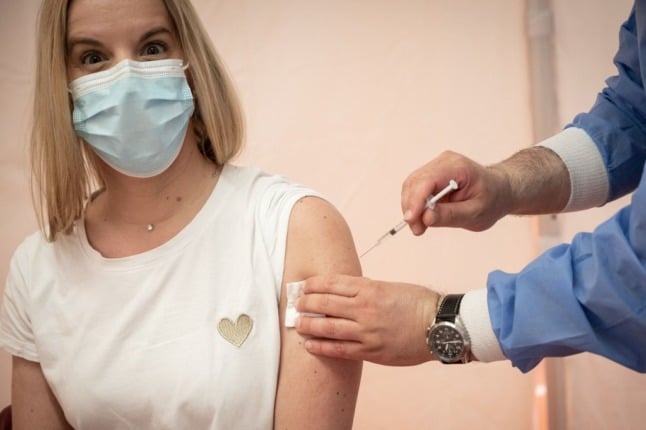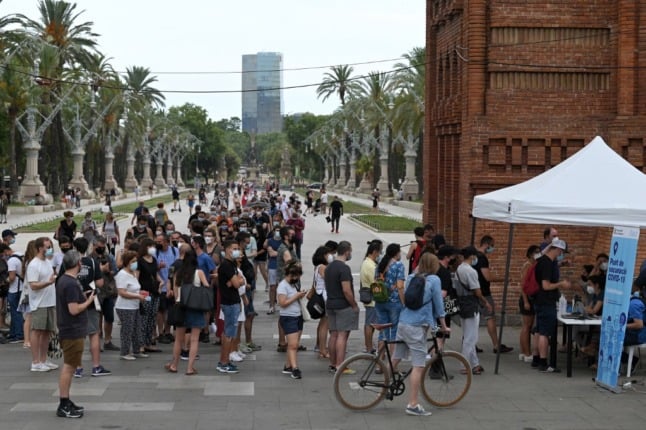Andalucia
Regional authorities have announced the vaccination campaign has stopped at the 35-years mark due to a reduction in vaccine deliveries. So those over 35 are getting vaccinated this week, people over 40 are being offered the single-dose Johnson & Johnson inoculation and Erasmus students in the southern region are also being vaccinated.
Andalusia doesn’t want to consider any age group 100 percent vaccinated as they can’t guarantee that there aren’t people who have fallen through the cracks, but at least all over 80s are reported to be fully immunised.
Aragón
Aragonese health authorities are already vaccinating those aged 34 to 37 and this week (July 5th to July 11th) they will start with those aged 32 and 33. Every Tuesday and Thursday two new individual ages are added to the list.
Around 90 percent of over 40s are reported to have received at least one dose and 56 percent the full vaccination.
Asturias
People aged 30 to 39 are now being vaccinated with their first dose in the northern region, whilst those in the 40 to 49 age group and people aged 60 to 69 who got the first dose of the AstraZeneca vaccine are now getting their second dose.
Over 70s who still haven’t received any dose are being offered the single-dose J&J inoculation, although the vaccination of this age group is considered almost complete. For the 50 to 59 age group, the vaccination campaign is reported as 80 percent complete.
Balearic Islands
Following the Covid outbreak in Mallorca, young people aged 16 to 29 are now being vaccinated in the Mediterranean archipelago.
The 60 to 69 age group is getting their second AstraZeneca dose as well to halt the rise in cases of the Delta variant. Around half of the people in this age group have received the full treatment.
Canary Islands
In Tenerife, which currently has 75 percent of Covid cases on the islands, a 24-hour vaccination point has been set up at the Santiago Martín Pavilion to give first doses to people aged 40 to 59.
Over 30s are now getting their first doses in the archipelago and in smaller islands such as El Hierro, La Palma and La Gomera, people over 20 can already get vaccinated.
Around 40 percent of the Canary population has been fully vaccinated.
Cantabria
Cantabria will start vaccinating 30 to 39 year olds with their first dose this week (July 5th-July 11th), as well as Erasmus students, whilst also continuing offering over 40s their first vaccination. Those aged 60 to 69 will receive their second dose of AstraZeneca.
Cantabria considers almost all over 50s in the northern region as fully vaccinated.
Castilla y León
People in their early 40s will continue getting their first doses and those aged 30 to 39 are slowly being called up as well. Over 50s and over 60s are getting their second doses.
Around 44 percent of people in the region in Spain’s interior have received their full vaccination treatment.
Castilla-La Macha
People in their 20s and 30s are now getting their first Covid-19 jabs and people in the 60 to 69 age group are receiving their second dose at an increasing rate.
Around 90 percent of over 40s have received at least one dose.
Catalonia
Catalan health authorities have started allowing those aged 16 to 29 to book an appointment for their first vaccines as infections among young people are increasing at an alarming rate in the region. They will also set up vaccination pop-ups at shopping malls and squares to target young people specifically.
Second AstraZeneca doses for those aged 60 to 69 have also been brought forward and are taking place now, as only about a quarter of people in this age group are fully vaccinated.
Around 36 percent of people in the region have received their full vaccination whilst 54 percent have at least one dose.
Valencia region
The vaccination of the 40 to 49 and 30 to 39 age groups continues in the eastern region. Individuals are being contacted via sms or phone call to get their first dose.
Erasmus students in the Valencia region will also be vaccinated from Monday July 5th to Friday 9th.
Valencian health authorities report that they have contacted all over 50s in the territory to receive at least their first dose.
Extremadura
Children aged 12 to 16 with disabilities will be vaccinated with their first dose this week, along with those aged 30 to 39.
Second doses will also be administered for those aged 50 to 59 and 60 to 69.
Galicia
Young people aged 20 to 29 can book a vaccine appointment from July 5th in Galicia.
The first vaccination of 30 to 39 year olds continues this week in the northwestern region.
More than 92 percent of over 40s in Galicia have at least one dose.
La Rioja
Spain’s wine region will continue to vaccinate people in their 30s this week, as well as administer first and second doses for those aged 45 to 49.
Practically 100 percent of everyone older than 60 has received at least one dose in La Rioja.
Madrid
Spain’s capital is focusing on vaccinating its 30 to 39 year olds this week, with the campaign kicking off on July 5th and a self-booking system being made available from July 7th.
Younger people going overseas for study purposes can also book a vaccine appointment from July 6th.
The inoculation of 40 to 49 year olds will continue as well, an age group which has to call their local health centre to book an appointment.
Madrid will open up a new five-year age slot for vaccines every week.
Murcia
No new age groups will be added to the vaccination campaign this week, meaning that the focus will be on giving everyone aged 35 to 69 first and second doses.
Children aged 12 to 16 in the high risk group will also get their first vaccine this week.
Murcia has fully vaccinated practically all over 70s.
Navarra
Young people aged 18 to 29 can now book a vaccine appointment to stem the rise in Covid cases in this age group in Navarra.
People aged 60 to 69 will also receive their second AstraZeneca doses this week.
Around 90 percent of all over 40s in the northern region have at least one dose of the vaccine.
Basque Country
People aged 30 to 69 will continue to receive first and second doses in the Basque country this week.
Students going abroad for study reasons can bring forward their vaccine appointments, but so far most young people aren’t being called up to get their first vaccinations.
To read all the latest information and news about Covid-19 vaccines in Spain, click here.



 Please whitelist us to continue reading.
Please whitelist us to continue reading.
Member comments